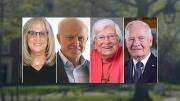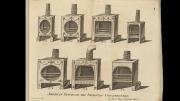“History is where the future begins.” That was the message as President Drew Faust spoke at Morning Prayers in Appleton Chapel today, continuing a presidential tradition of opening the new academic year this way. In light of Harvard College’s 375th anniversary—it was legislated into being on October 28, 1636, she noted, and named for the tubercular John Harvard two years later—Faust reverted to her role as historian-in-chief in framing her remarks. “We have a singular and distinguished history,” she said, “and this year—in a variety of ways—from birthday cake in October through Commencement in May—we will celebrate it.” She then explored “why Harvard’s past matters and why it is an invaluable resource” as the University navigates toward concluding its fourth century.
She cited
predecessors both remote and recent who remind us of what is possible for us by their demonstration of what was possible for them. Lives at the highest levels of public service: from John and John Quincy Adams to Theodore and Franklin Roosevelt, to John Kennedy to George W. Bush to Barack Obama. Lives of creativity: from Henry David Thoreau to Leonard Bernstein, to John Updike, Margaret Atwood, and Adrienne Rich. Lives dedicated to advancing equality and human rights: Charles Sumner, W.E.B. Du Bois, Helen Keller. Lives of intellectual discovery: Ralph Waldo Emerson, William James, John Rawls, and some 50 Harvard Nobel winners. Lives sacrificed for the nation, remembered on the walls here in Memorial Church and Memorial Hall. This is a history that nurtures aspiration, that inspires us with what is possible and reminds us what is necessary—the responsibility that accompanies education and opportunity, the privilege to contribute to purposes larger than ourselves.
Revisiting themes from her installation address in 2007, Faust sought to get beyond “the stranglehold of the present,” noting universities’ unique accountability “to the past and to the future,” beyond the “inevitably myopic present.” The propellant force, she said, is “an unwavering commitment to the importance of learning and knowledge,” as valid today as in the seventeenth century. History, finally,
enables us to see contingency and opportunity. It offers us the foundation for imagining a different world and understanding what it takes to build it. To have a history is to have a context—for both insight and action. It is to know that we and those who have preceded us have been dedicated to using knowledge to invent a future. The future, Yogi Berra is said to have observed, isn’t what it used to be. That is because we are living in a future our predecessors in this remarkable institution worked to create for us. History is where the future begins.
Faust's full text appears here. For the president’s views of Harvard’s present prospects, read the interview with Faust in the special 375th anniversary issue of Harvard Magazine.








